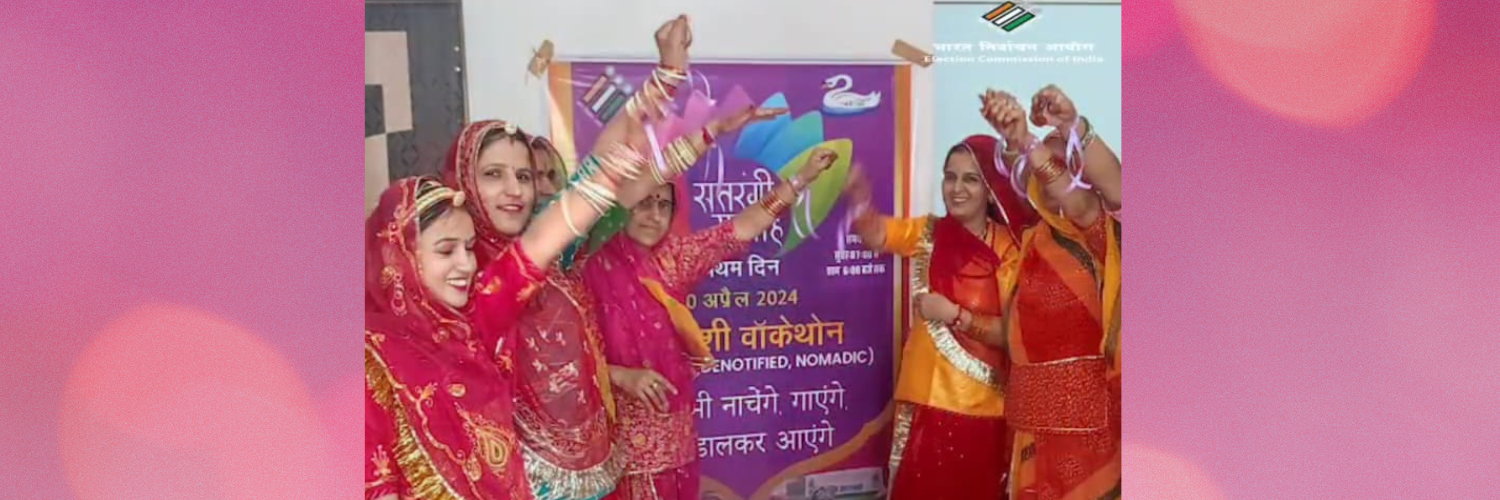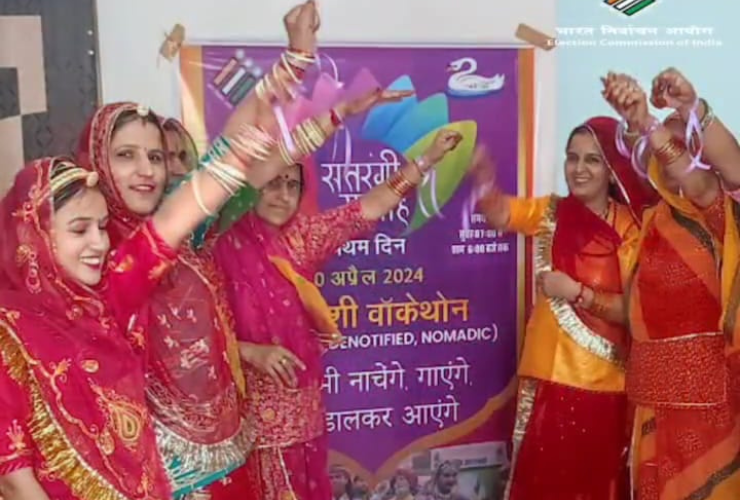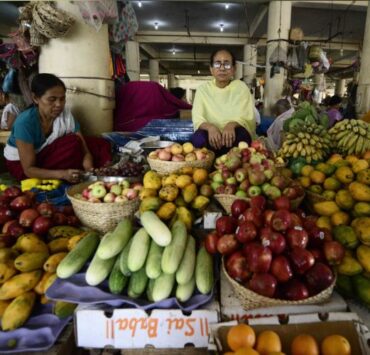
By Rakhee Roytalukdar

The Nari Shakti Vandan Adhiniyam Bill, popularly called the Women’s Reservation Bill, passed in 2023, has been hailed as a game-changer in India’s political landscape. The long-pending Bill was passed in both houses of Parliament, almost unanimously, with just two votes against it. The Act is meant to ensure reservation of one-third of seats in the Lok Sabha and State Assemblies for women. In reality though, it changes nothing much on the ground. The Act will not come into effect till several years because of a significant clause. And in Rajasthan, both the major parties have fallen short in allocating an adequate number of seats to women for the Lok Sabha Elections, the first phase of which starts on April 19.
Tara Krishnaswamy, co-founder of Political Shakti, a non-partisan collective working for greater political representation of women, said the Nari Shakti Vandan Adhiniyam “is an eyewash”. “The Nari Shakti slogan is meaningless. A dead-in-the- water bill, it also has a 15-year clock that started from 2023,” she says.
Political activist Yogendra Yadav had tweeted in September 2023 that one-third of seats for women is a political myth. He had said: “Media reports say women’s reservation would happen in 2029. This is misleading. It may not happen till 2039. Most media reports miss the real significance of the delimitation clause. Article 82 (amended in 2001) virtually bars delimitation prior to the first census post 2026. That can only be in 2031. Most observers do not remember that the Delimitation Commission takes 3 to 4 years (the last one took 5 years) to give its final report. Besides, the forthcoming delimitation could be contentious, given the population ratio changes. So, we are looking at a report around 2037 or so, which can only be implemented by 2039.” Delimitation is the process of redrawing the boundaries of Parliamentary and Assembly constituencies, resulting in an increase in the number of constituencies according to the latest population based on the Census.
Rajasthan’s women outreach
The Bharatiya Janata Party (BJP) in Rajasthan has given seats to five women candidates – Indu Devi Jatav from Dholpur Karauli (reserved seat for Scheduled Castes), Priyanka Balan from Sriganganagar (reserved for Scheduled Castes), Manju Sharma from Jaipur, Jyoti Mirdha from Nagaur, and Mahima Vishvaraj Singh from Rajsamand.
The Indian National Congress (Congress) has given seats to only three women candidates – Sanjana Jatav from Bharatpur (reserved seat for Scheduled Castes), Sangeeta Beniwal from Pali, and Urmila Jain Bhaya from Jhalawar-Baran.
Of 25 Lok Sabha constituencies in Rajasthan, Bikaner, Dholpur-Karauli, Srigangnagar and Bharatpur are reserved constituencies for Scheduled Castes. Dausa, Udaipur and Banswara are reserved for Scheduled Tribes.
Sanjana Jatav, 25, is the youngest candidate contesting this Lok Sabha Election. Her name is said to have been recommended by Priyanka Gandhi, who aims at increasing representation of women in Parliament. Sanjana was given the Vidhan Sabha ticket in 2023 from Kathumar and lost to the BJP’s Ramesh Khinchi by 409 votes.
“It was my first election. I had no experience, yet people gave me a lot of love. What was missing was just luck,” she had said after her defeat.
In 2019, only three women from Rajasthan, all from the BJP, got elected to the Lok Sabha. They were Ranjita Koli from Bharatpur (reserved seat for Scheduled Castes), Jaskaur Meena from Dausa (reserved seat for Scheduled Tribes), and Diya Kumari from Rajsamand.
In 2019, other than Diya Kumari, Meena and Koli belong to a Scheduled Tribe (ST) and a Scheduled Caste (SC) respectively. The BJP usually chooses women in SC/ST seats. This time (2024), the Congress has fielded Jatav from Bharatpur, a reserved constituency for Scheduled Castes.
In 2014, there was only one woman MP from the BJP, Santosh Ahlawat from Jhunjhunu. The BJP had made a clean sweep of all the 25 Lok Sabha seats then.
Rajasthan’s women MPs and MLAs
Jaipur’s Gayatri Devi became the first woman MP from Rajasthan in the 1962 Lok Sabha elections and won in a massive landslide and a vote share of 77.08% on the Swantantra Party’s ticket. She went on to win again in 1967 and 1971.
In 1996, 25 women contested the Lok Sabha elections followed by 20 in 1998, 15 in 1999, 31 in 2004, and 27 in the 2014 polls, as per the data provided by the Election Commission. Between 1952 and 1989, not more than six candidates had contested in each of the seven Lok Sabha elections. In 1991, there were 14 women candidates in the fray, after which the numbers started increasing. In 1996, 25 women contested elections followed by 20 in 1998, 15 in 1999, 31 in 2004 and 2009 and 27 in the 2014 polls.
Rajasthan also has had a woman chief minister in Vasundhara Raje (2003 to 2008 and 2013 to 2018). Raje was elected a member of Rajasthan’s Assembly from Dholpur in 1985, and has won from the Jhalawar-Baran Lok Sabha seat five times since 1989. . Girija Vyas from the Congress also represented Udaipur four times starting from 1991.
In the 2023 Rajasthan Assembly polls, 50 women candidates were given tickets, of whom only 20 won. There are nine MLAs each from the BJP and the Congress and two are Independent.
The nine winning Congress candidates were Shimla Devi (Anupgarh), Sushila Dudi (Nokha), Rita Chaudhary (Mandawa), Shika Meel Barala (Chomu), Shobharani Kushwah (Dholpur), Anita Jatav (Hindaun), Indra (Bamanwas), Geeta Barwar (Bhopalgarh), and Ramila Khadia (Kushalgarh).
The BJP’s women candidates who emerged victorious were Diya Kumari (Vidhyadhar Nagar), Anita Bhadel (Ajmer South), Manju Baghmar (Jayal), Shobha Chauhan (Sojat), Deepti Kiran Maheshwari (Rajsamand), Kalpana Devi (Ladpura), Vasundhara Raje (Jhalrapatan), Siddhi Kumari (Bikaner East), and Nauksham Chaudhary (Kaman).
Ritu Banawat (Bayana) and Priyanka Chaudhary (Barmer) won as Independents.
Of these constituencies, Anupgarh, Hindaun, Bhopalgarh, Ajmer (South) and Jayal are reserved for scheduled castes while Bamanwas is reserved for scheduled tribes.
The number of women in this Vidhan Sabha is lower than that of the previous Vidhan Sabha, which saw 24 women MLAs, including 12 from the Congress and 10 from the BJP, one from the Rashtriya Loktantrik Party and one Independent.
Women activists say the parties only provide sops to women and look at them as vote banks but when it comes to providing adequate political representation, not only the national parties but also the regional parties shy away from giving them tickets. Cash assistance, subsidised LPG cylinders, free education, free bus rides and so on are targeted at women voters but when it comes to giving them political representation, winnability and caste factors come into play. This only underlines the fact that political parties see women as a voting block, offering sops in the hope that they swing election results in their favour. But they lack the foresight to give tickets to women.
Tara Krishnaswamy of Political Shakti pointed out: “The number of women in Parliament and state Assemblies is pathetic. If one analyses the figures over a period of time and across states, a behavioural pattern emerges – that of no gender justice. They do not generally field women and even if they do, they consider winnability and caste as the most important factors. Except for the Trinamool Congress and Biju Janata Dal, no political party is serious about giving political representation to women. The BJP has a majority and it can easily send more MPs to the Upper House but it doesn’t.”
On the tendency of giving tickets to women in reserved constituencies in Rajasthan, Tara said: “National parties mostly give tickets on caste arithmetic. At least 50% of voters in all constituencies are women but no party will give the ticket to a woman in a general constituency. They will only give sops to women voters but no real political power. There are hardly any women in responsible positions in the party, hardly any national general secretaries or leaders in top slots. There is no effort to inculcate leadership amongst women.”
Related:
Rajasthan 2023: Tapping into women’s vote
Nari Shakti? Not really as both BJP, Congress fall short on women candidates in Rajasthan
Rakhee Roytalukdar has been a journalist for more than 25 years. She has been writing on politics, gender issues, tourism, wildlife, human interests and other topics. Having started with The Telegraph, she has worked with The Times of India, IANS, The Pioneer, UNI and others. She covered Rajasthan as a correspondent for The Telegraph for more than 10 years. She is at present writing for Deccan Herald.
Edited by Saraswathy Nagarajan and Sandhya Srinivasan




